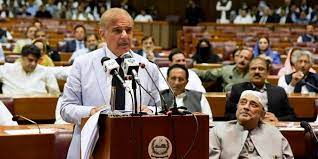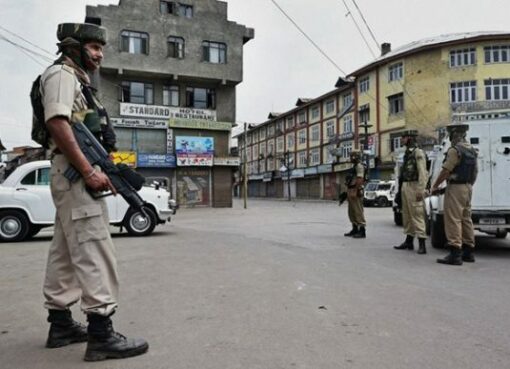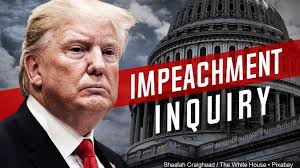By Prasad Nallapati
Pakistan polity has again been struck by Allah, Army and America. The new entrant into the vortex of cyclical changes is Shahbaz Sharif, the younger brother of the three-time Prime Minister Nawaz Sharif. He is long known to be the darling of the Army and the terrorist groups allied with it. He is acceptable to America as well as China, as the real driving force behind any power combination in the country is the military establishment.
Now, what has changed, what not and what are the implications?
The problem is that the Pakistani politicians never learn even fundamental lessons of the country’s statecraft despite repeated punishments. From Zulfiqar Ali Bhutto, Nawaz Sharif, Benazir Bhutto, Asif Ali Zardari to the latest Imran Khan, all tried to challenge the mighty `establishment’ at one point or the other, despite the fact of having come to power with its covert support.
Imran Khan, like his illustrious predecessors, had made unsuccessful attempts to shake off the establishment’s overbearing control over his government. He delayed the extension of the Army Chief and resisted change of the Inter-Services Intelligence (ISI) Chief Faiz Hameed, who was said to have been the key in stitching together the ruling coalition after the 2018 elections.
The Pakistan Tehreek-e-Insaaf (PTI) government tried to steer its foreign policy to an `adventurous’ alignment with Russia-China combine on one hand and a rebellious Islamic union with Erdogan’s Turkey and Mahathir’s Malaysia on the other. Prime Minister Khan was in Moscow meeting President Putin as Russian tanks rolled into Ukraine. This was in sharp contrast to the country’s traditional alliances with the United States of America and Saudi Arabia. Pakistan was duly punished financially and diplomatically for these adventures, forcing the Army to intervene and restore the balance.
There is some merit in Imran Khan’s allegations of the US engineering change of his regime. The evidence he had thrown up in the form of the diplomatic cable from Ambassador Asad Majeed appeared to prove America’s indulgence. It quoted the US Assistant Secretary of State Donald Lu telling the Pakistani envoy, “Going ahead would be tough” for Pakistan, if the vote of no-confidence against the prime minister did not succeed. “Pakistan would be forgiven for their mistakes if the no-trust move succeeded.”
The Chief of the Army Staff (COAS) Gen. Qamar Javed Bajwa has already given indications of mending relations with the US, UK and Europe. Speaking at the Islamabad Security Dialogue on April 2, the General stated, “we share a long and excellent strategic relationship with the US,” and Pakistan sought to broaden and expand relations with both China and the US without impacting our relations with either.” He said all the right words to please the US. He described the Russian invasion of Ukraine as a “huge tragedy and must be stopped immediately.” He even went to the extent of saying, “Despite legitimate security concerns of Russia, its aggression against a smaller country cannot be condoned.”
Gen. Bajwa has tried to suggest that Pakistan is better placed to serve American interests than countries like India, without naming it. He called on the international community “to support cooperative countries such as Pakistan rather than those who wish to gain from this contest.”
Pakistan is expected to get a more positive response from the US, whose help is urgently needed to overcome current economic crisis in the country, like debt servicing, IMF loans, FATF listing, etc. The US also is expected to warm up to Pakistan’s overtures as a measure of expression of unhappiness with India’s “unhelpful” attitude toward Russia and its military aggression against Ukraine.
Bajwa’s comments at the Dialogue this year as well as last year indicate a willingness to build bridges with India in an attempt to resolve all disputes peacefully through dialogue. While the statements look like “old wine in a new bottle”, his tone does suggest a little softer stance compared to much harder positions of Khan and his foreign minister Shah Mehmood Qureshi. The latter duo thwarted efforts of `back channels’ to open a dialogue with India and resume trading relations. It can, therefore, be expected that Pakistan would again open a `behind the scenes’ dialogue with India. While there is unlikely to be any substantial change on core issues, trade and economic aspects are likely to get fresh attention.
Domestic Front
The new Premier faces formidable challenges going forward. He is heading a shaky coalition of mutually antagonistic political parties. Fresh elections are due in about six to twelve months, and it is doubtful if they all can agree to go to polls together. Shahbaz’s Pakistan Muslim League (NS) is itself a divided house with his elder brother Nawaz Sharif still commanding enormous clout over the party. Nawaz’s daughter Maryam claims the legacy of her father, while Hamza Sharif, an equally ambitious son of Shahbaz, has his own plans.
Imran Khan is not an insignificant force to contend with as he enjoys overwhelming support of the youth and middle classes. Massive demonstrations in Islamabad, Peshawar and other parts are a clear indication of troubled times ahead. The country is facing dire economic situation which has no short-term solutions. Shahbaz is known to be an able administrator as the Chief Minister of Punjab, but he is unlikely to fare any better than his predecessors in the long run.
His loyalty to the Army is long known. Even while his brother, Nawaz Sharif, had serious tussles with the military in both his terms as Prime Minister, Shahbaz maintained cordial relationship with the Army.
He also maintained extensive contacts with various terrorist groups with full knowledge of the Army and the ISI. Files recovered from Osama bin Laden’s compound in Abbottabad revealed that Shahbaz Sharif, as Punjab Chief Minister, sought to strike a peace deal with the Tehreek-e-Taliban Pakistan (TTP) through al Qaeda. One of the papers in the files is a letter written by Atiyah Abd al Rahman, who was then the general manager of al Qaeda, to Osama bin Laden in July 2010. It reveals a complicated nexus involving Al Qaeda, the Pakistani Taliban, Shahbaz Sharif, and the ISI.
Shahbaz’s Punjab government had underwritten the expenses of the madrasas and other institutions run by the Lashkar-e-Taiba chief Hafeez al Saeed through official budgetary allocations. Other terrorist groups like Sipah-e-Sahaba, Jaish-e-Muhammad, and Lashkar-e-Jhangawi, all have their headquarters in Punjab and had enjoyed official patronage of Shahbaz’s cabinet colleagues.
His initial remarks as the Prime Minister on India’s Kashmir are on known lines. But, at the same time, the Sharif brothers are primarily businessmen and have had extensive commercial relations with India. He would not be averse to opening up trade relations with India. Key Pakistani businesses are equally positive to such prospects. Hence, this is an area that might gain a quick traction.
Pakistan needs India for its prosperity, but it cannot shed its `Political Islam’ to make it a reality.
Is it then in India’s interest to respond to Pakistani overtures toward trade relations without a fundamental change in their terrorist tactics? That is worth pondering over.
(Prasad Nallapati is President of the Hyderabad-based think-tank, `Deccan Council for Strategic Initiatives’, formerly known as Centre for Asia-Africa Policy Research. He is a former Additional Secretary in the Govt of India)




